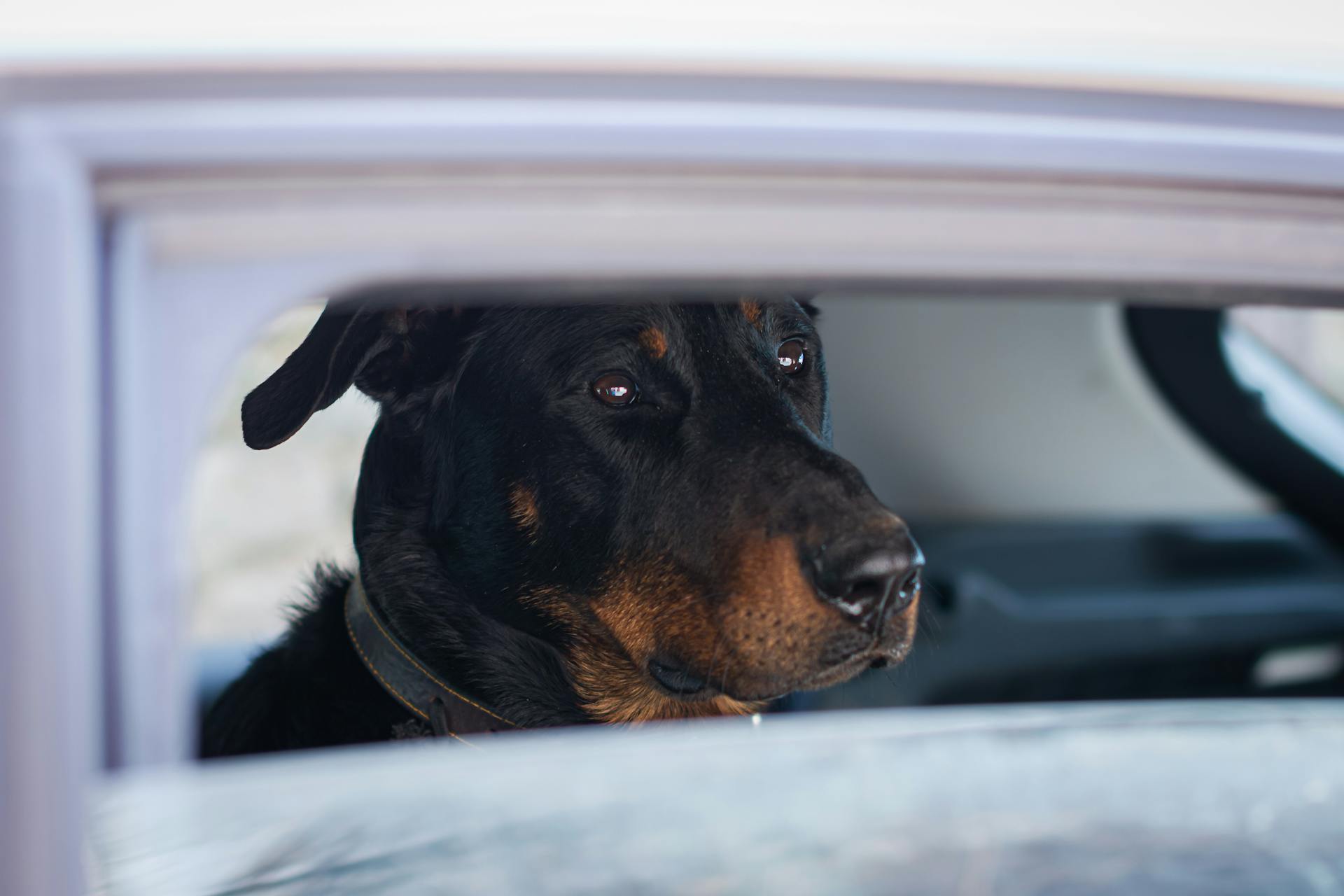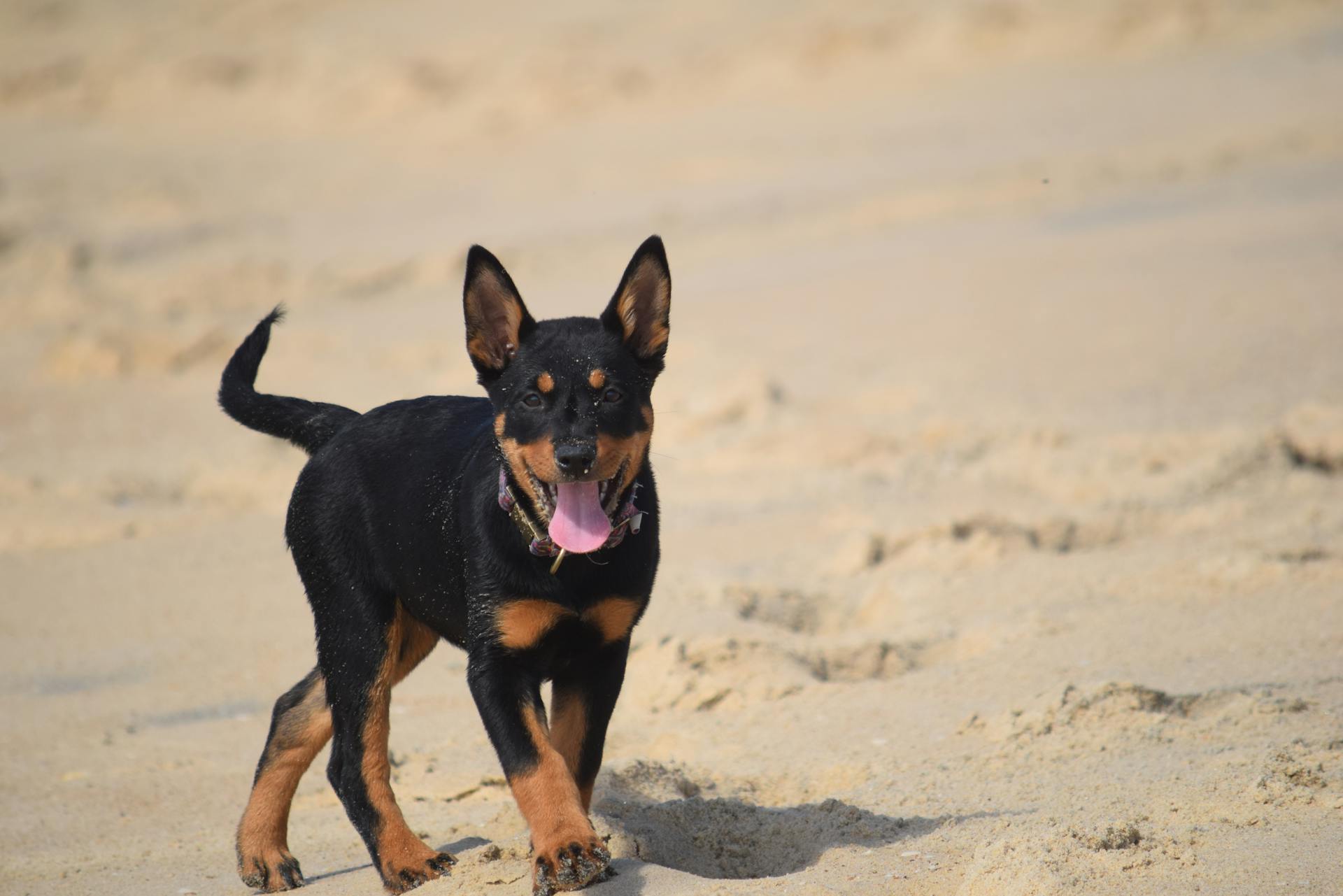
The Blue Beauceron is a majestic breed that requires careful consideration before bringing one home. They are a large dog, weighing between 70-100 pounds.
Their intelligence and athleticism make them a joy to train, but they also require consistent exercise and mental stimulation to prevent boredom and destructive behavior. A daily walk or run, combined with playtime, is essential to keep them happy and healthy.
With their short coats, they are relatively low maintenance when it comes to grooming, but their thick fur does shed heavily, especially during shedding season. Regular brushing can help reduce the amount of loose hair.
If you're willing to put in the time and effort, a Blue Beauceron can be a loyal and loving companion for many years.
Temperament and Characteristics
The Blue Beauceron is an intelligent breed with a strong instinct to herd and protect its "flock", whether that's children, pets, or even sheep.
They're generally tolerant of children, but it's essential to socialize them at a young age to ensure they get along with kids and other pets.
Beaucerons are naturally protective of their family, which can make them great guard dogs, but this also means they can be wary of strangers.
If you're looking for a dog that will stick by your side, the Blue Beauceron is a great choice.
They require a lot of exercise to burn off their excess energy, so a fenced-in backyard or a dog park is a must.
Here are some key temperament and characteristic facts about the Blue Beauceron:
To ensure your Blue Beauceron grows into a well-behaved adult, be prepared to provide a firm and confident hand during training.
History and Origins
The Beauceron breed has a rich history that dates back to the 1500s in France. Developed to herd sheep and cattle, this breed was highly prized for its intelligence, strength, and loyalty.
In fact, Beaucerons were used by the French army during World War I as messenger dogs in the trenches and for land mine detection. They also served as police dogs and in search and rescue operations.
You might like: Blue Heeler Breed History
The Beauceron's origin story is fascinating, with historical documents mentioning the breed as far back as the 1500s. It's believed to have been developed from the same ancestors as the long-haired Briard sheepdog.
This breed is also known as Berger de Beauce, or shepherd of Beauce, and Bas Rouge, or red stockings, due to its distinctive reddish accents. The Beauceron's double declaws on the hind leg are a unique feature that sets it apart from other breeds.
The breed was virtually unknown outside of France until World War II, but it's now recognized by the American Kennel Club's Herding Group, having been fully inducted in 2007.
Readers also liked: Kuvasz Breed
Care
The Blue Beauceron is a watchful and loyal breed that will often stay by your side. They're energetic and protective, making them great family dogs.
Their double coat sheds minimally, but you'll still see some shedding in the spring and fall. Regular brushing will help keep their coat looking its best.
To keep your Blue Beauceron happy and healthy, provide plenty of durable chew toys to prevent destructive behavior.
A weekly brushing session will keep their coat in top condition, and a bath every two months will keep them clean. Don't forget to brush their teeth at least a few times a week to protect against oral health conditions.
Here's a quick rundown of what you can expect from a Blue Beauceron's grooming needs:
- Brush their coat once a week
- Bathe them every two months
- Brush their teeth at least a few times a week
- Trim their nails once a month
Regular nail trimming and ear cleaning will also help keep your Blue Beauceron healthy and happy.
Training Your
The Blue Beauceron is a highly trainable breed, known for its independent thinking and strong work drive. Socialize your dog from a young age to expose it to a variety of situations so it is not shy or aggressive.
To train your Blue Beauceron, expect some pushback along the way. They tend to be confident and strong-willed, but respond well to training if you appear confident and composed.
Since Blue Beaucerons are fast learners, they will pick up on everything you're teaching if you give your undivided attention to training. Advanced obedience training can give your dog a chance to put their natural herding skills to work, even learning Treibball, a game where it gets to "herd" large balls.
Calmness may be the only behavior problem you have to worry about with your Blue Beauceron. Teaching your dog to remain calm, cool, and collected as a puppy is crucial, and training makes a world of difference.
With proper training, your Blue Beauceron can thrive and become a great companion. They are slow to mature, but once old enough, they excel at training and are very good with tasks involving learning and memory, agility, and obedience.
Consider reading: Blue Heeler Dog Training
Frequently Asked Questions
Is Beauceron a rare breed?
No, Beaucerons are not considered a rare breed. Their relatively common status makes them a great option for those interested in this unique breed.
What is a Harlequin Beauceron?
A Harlequin Beauceron is a unique color variation featuring a black and tan coat with bluish-gray patches. This distinctive pattern makes Harlequin Beaucerons a rare and striking addition to the breed.
Featured Images: pexels.com
